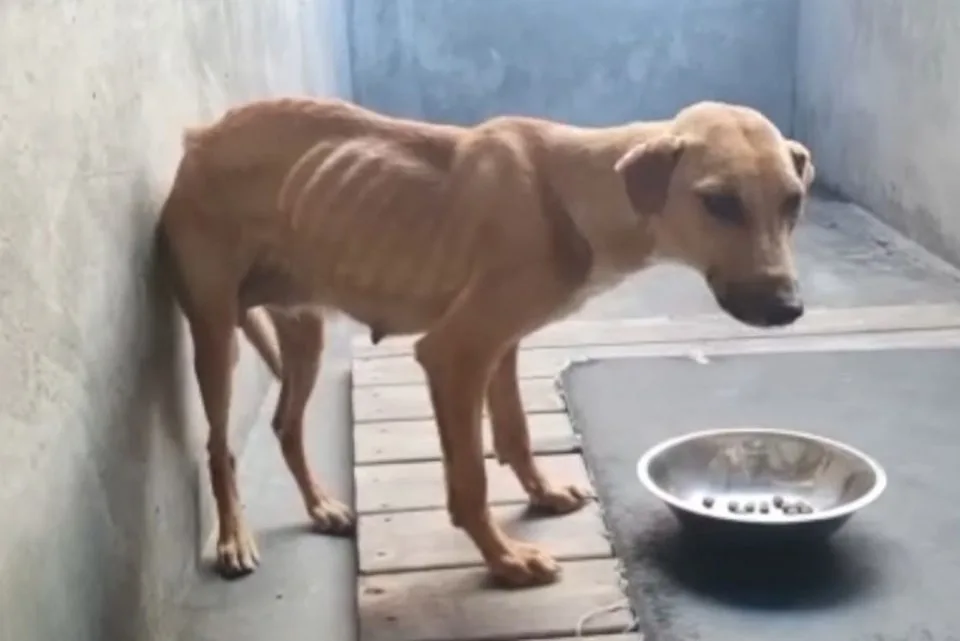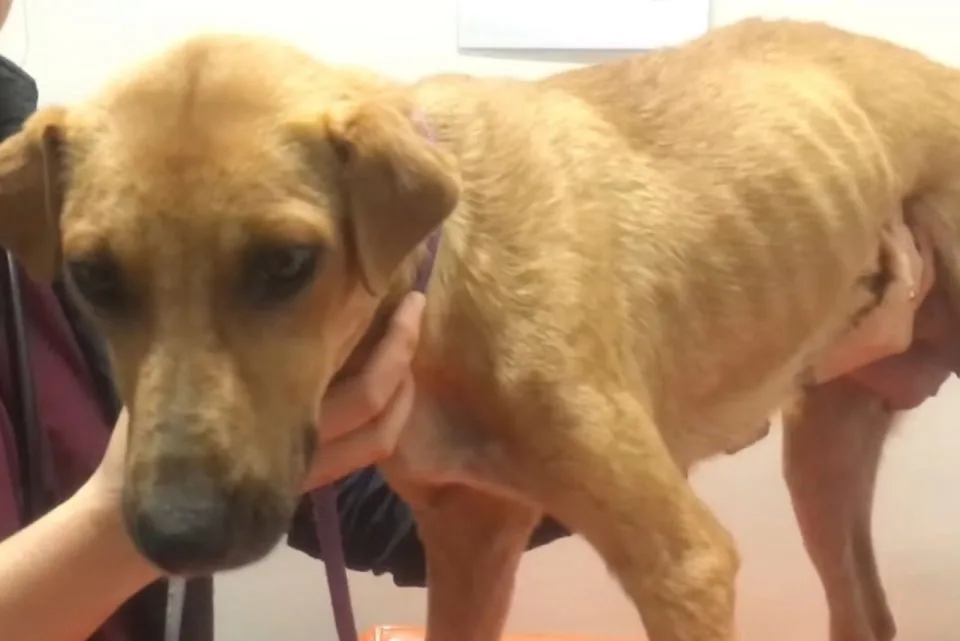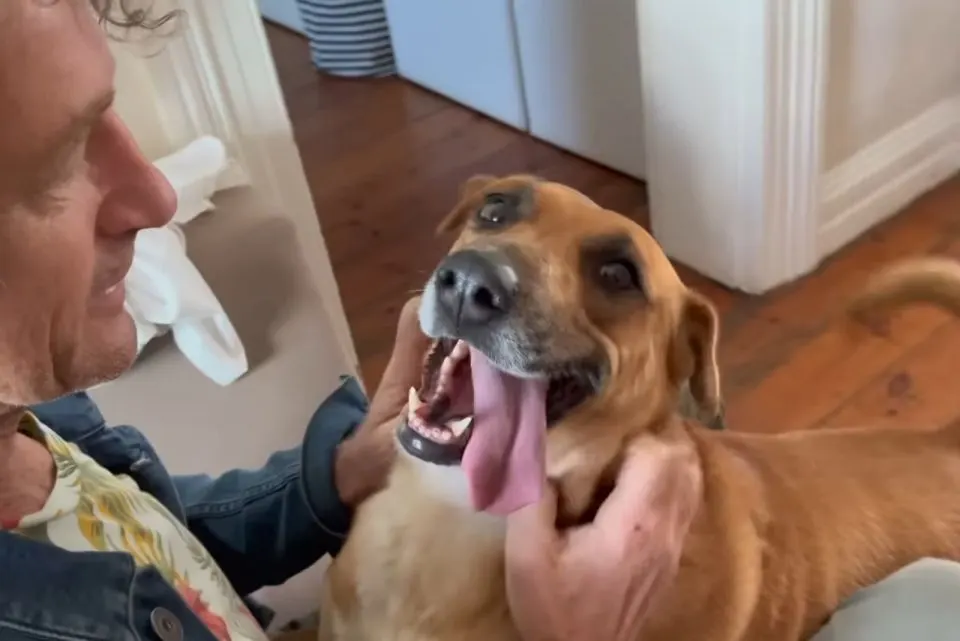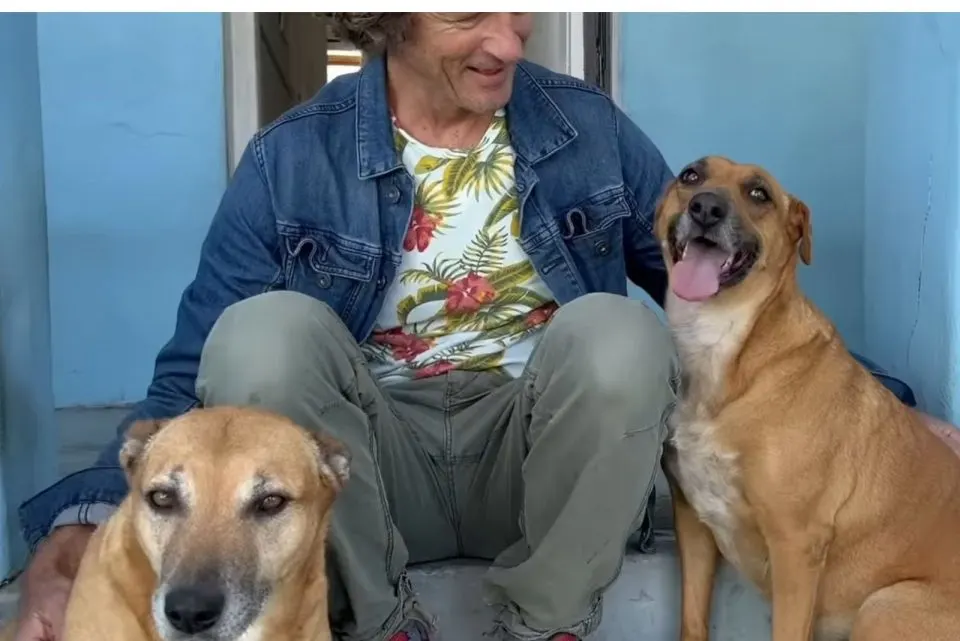When you believe everything is lost, your luck may still somehow change.
Not every dog is as blessed as Ginger was.
She was down, written off, and facing the eternal sleep list.
Ginger’s life was a mess and she had no bright future.
You might wonder: How is that considered to be blessed?
Well, turns out that Ginger’s life wasn’t going to end after eating her final meal.
It turns out that a lady called Fortune had other plans for Ginger…
When You Least Expect It

Can you imagine the feeling of being sentenced to sleep forever?
We’ll leave out the real word for it and sugarcoat it a bit.
Still, it isn’t sweet nor would it ever be.
The feeling you get when you know it’s all coming to an end and there’s no way back is unbearable.
Hopeless. Helpless. Desperate.
That’s just how Ginger felt.
Ginger was a good guard dog. She was loyal, never aggressive to those who didn’t earn it, and the best dog she could ever be.
Apparently, that wasn’t enough for her owner.
He decided that Ginger wasn’t a good guard dog for him, as if it was up to him to decide if a dog is good or not.
Thus, he surrendered her to the shelter.

Ginger was all skin and bones. Her ribs were protruding and her eyes had lost their spark.
Ginger knew her chances were low. She could only pray for a miracle.
And Then, The Miracle Happened

When people learned about Ginger, they were touched to the core. The hopeless stray got so many inquiries and financial support that all her vet bills were paid off.
One by one, miracles started happening in Ginger’s life and she wasn’t sure if she was dreaming.
Her luck changed, and Ginger finally realized that what was supposed to be her last meal was actually her last meal at the shelter.
She was finally getting a loving home!
A kind man adopted Ginger and turned her life around 180 degrees. She has a hooman that loves her, a playful sister that looks a lot like her, and stability in life.

She got the feeling of being cherished.
She got to understand that this time, nobody is kicking her out.
And, she was beyond thankful for everything, especially her daily walkies with her new owner and her sister.
Ever noticed your furry companion twitching in their sleep? It’s a common sight that often leaves pet owners wondering what’s going on in their dog’s dream world. Those adorable twitches and kicks may seem random, but there’s more to it than meets the eye. As a seasoned dog trainer, you’ve likely observed this phenomenon countless times, sparking curiosity about what triggers these movements during their slumber.
Your four-legged friend’s twitching in their sleep is a fascinating behavior that has intrigued dog lovers for years. It’s a window into their subconscious world, offering insights into their mental and physical state even when they’re sound asleep. Understanding the reasons behind these sleep twitches can provide valuable clues about your dog’s well-being and offer a glimpse into their dream adventures.
Understanding Dog Sleep Behavior
The Sleep Cycle of Dogs
Dogs’ sleep cycle consists of two main phases: Rapid Eye Movement (REM) sleep and Non-Rapid Eye Movement (NREM) sleep. During REM sleep, dogs experience vivid dreams, which might lead to twitches, kicks, or vocalizations. This is a natural part of their sleep cycle and indicates that your furry friend is deeply immersed in dreamland.
Signs of Healthy Sleep in Dogs
Healthy sleep in dogs is characterized by specific signs, such as steady breathing, relaxed muscles, and minimal movement. When your dog is in a deep sleep, you may notice gentle breathing and peaceful stillness as they recharge their energy for the day ahead. These signs indicate that your canine companion is experiencing restorative sleep, essential for their overall well-being.
The Science Behind Dogs’ Twitching in Sleep
What Are Sleep Twitches?
When your furry friend is dozing off, you may notice them twitching. These small movements are commonly known as sleep twitches. Dogs experience different sleep stages similar to humans. One of these stages is called Rapid Eye Movement (REM) sleep, where dreams occur, resulting in twitches, kicks, or even soft barks during sleep.
The Role of the Nervous System
During sleep, the nervous system plays a crucial role in controlling your dog’s movements. Twitches are often a result of the brain signals sent to the muscles, causing them to react involuntarily. This process is similar to human muscle twitches during sleep. The nervous system ensures that your dog stays relaxed and peaceful while experiencing these movements, indicating a normal and healthy sleeping pattern.
Common Reasons for Sleep Twitching in Dogs
Dreaming and REM Sleep
While in the REM stage of sleep, dogs experience dreaming, just like humans. This phase is characterized by increased brain activity, vivid dreams, and muscle twitches. Dogs may exhibit twitching, kicking, or even vocalizations during this stage, indicating that they are immersed in a dream world. These movements are often a normal part of the sleep cycle and should not be a cause for concern.
Muscle Relaxation and Spasms
During sleep, dogs go through periods of muscle relaxation where their bodies may twitch or spasm involuntarily. This is a natural response as their muscles relax and contract throughout the sleep cycle. Twitching and spasms can occur during both REM and NREM sleep stages. It’s essential to observe the overall signs of a dog’s sleep, such as steady breathing and relaxed muscles, to ensure that these movements are part of a healthy rest.
rather than being alarmed by your furry friend’s sleep twitching, understand that it’s a normal part of their sleep cycle. By recognizing the reasons behind these movements, you can appreciate your dog’s peaceful slumber even more.
When to Be Concerned About Your Dog’s Twitching
Identifying Normal Vs. Excessive Twitching
If you notice your dog twitching occasionally during sleep, especially during the Rapid Eye Movement (REM) stage, it’s usually normal. Dogs, like humans, experience dreams during this phase, leading to twitches and movements. This behavior should not raise concern as it’s a regular part of your dog’s sleep cycle. However, if the twitching seems excessive, repetitive, or disturbs their sleep, it might be a cause for concern.
Health Issues Related to Excessive Twitching
Excessive twitching in dogs during sleep could be associated with underlying health issues. If your dog displays intense or frequent muscle twitches, spasms, or abnormal movements, it could signal potential problems. Health issues such as seizures, neurological disorders, or muscle conditions might be causing the excessive twitching. If you observe such behaviors regularly, consulting your veterinarian is advisable to rule out any serious health concerns.
How to Ensure a Comfortable Sleep for Your Dog
Creating the Ideal Sleep Environment
Make sure your dog has a cozy and quiet place to sleep. Set up a comfortable bed with soft padding for your furry friend. Keep the sleeping area warm and draft-free to help your dog relax and sleep better.
Monitoring and Managing Sleep Behavior
Pay attention to your dog’s sleep patterns and behaviors. If you notice excessive twitching or movements during sleep, it’s essential to monitor them closely. Occasional twitching is normal, but if it becomes frequent or disruptive, consult your veterinarian to rule out any underlying health issues. Regular monitoring of your dog’s sleep behavior can help you detect any potential problems early on.
Conclusion
So, now you know why your furry friend twitches in their sleep. It’s all part of their dream-filled REM sleep cycle. Remember, a little twitching here and there is totally normal. But, keep an eye out for any excessive or unusual movements. If you notice anything out of the ordinary, it might be time to consult with your vet. Just ensure your pup has a comfy sleeping spot and watch over them with care. Sweet dreams to your loyal companion!
Frequently Asked Questions
Why do dogs twitch during sleep?
During sleep, dogs enter Rapid Eye Movement (REM) sleep where they experience dreams, leading to twitches and movements. This is a normal part of a dog’s sleep cycle and should not be a cause for concern.
Is twitching during sleep harmful for dogs?
Normal twitching during sleep is not harmful for dogs and is part of their natural behavior. However, excessive, repetitive, or disruptive twitching may indicate underlying health issues and should be monitored closely.
When should I be concerned about my dog’s twitching during sleep?
If your dog experiences excessive or unusual twitching during sleep, such as continuous or severe movements, it could signal underlying health problems like seizures, neurological disorders, or muscle conditions. In such cases, consult with a veterinarian promptly.
How can I ensure my dog has a comfortable sleep environment?
Create a cozy and quiet sleeping place for your dog with a comfortable bed. Monitor your dog’s sleep behaviors regularly to detect any abnormal twitching early on, allowing for timely intervention by a veterinarian.
[no_toc]

Hey there, I’m Janet Brooks, a dog-loving student from California. I’m all about helping pups in need, especially those without homes. Me and my awesome friends work together to give shelter and love to stray dogs. Oh, and I also write blogs about dogs to share helpful info.